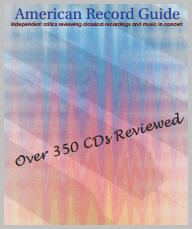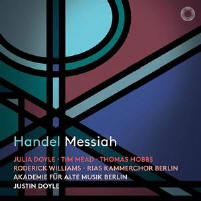Texte paru dans: / Appeared in: |
||||
|
Outil de traduction ~ (Très approximatif) |
||||
|
Reviewer: William
J. Gatens
There is no such thing as a
perfect recording of Messiah. I doubt that any two critics could agree on
what that would be like. Most period- instrument recordings simply annoy me.
One of the few that does not is the 1988 recording by Trevor Pinnock and the
English Concert (DG). I like his dignified pacing and the refinement of the
playing and singing. Even so, there are things that could have been better,
and I have spoken with colleagues who don’t much care for that recording.
The trouble is that so many conductors, when faced with such a familiar and
often-recorded work, seem to feel obliged to leave their individual mark so
as to stand out from the crowd. This may be unfair to many interpreters, but
I do not think it my imagination that many eccentricities are foisted on
this masterwork that would not be if it were less well-known. Here again, I
like Pinnock because he plays it down the middle. The purpose of this
preamble is to give some context to my judgement that the present recording
contains much to recommend it.
The singers and players are
first rate. Justin Doyle presides over some remarkably crisp and clean
playing and singing. He favors brisk tempos, sometimes faster than I would
like, but rarely to the point of eccentricity. Of course, his singers and
players are undaunted by such tempos. ‘For Unto Us a Child Is Born’, for
example, is taken very quickly, but it comes across as buoyant and jovial,
not driven. The four solo singers leave nothing to be desired in terms of
vocal technique and poise. I was quite taken with the mysterious quality
bass Roderick Williams imparts to ‘For Behold’. Without wishing to slight
the others, I was especially impressed with countertenor Tim Mead. The male
alto voice is an acquired taste, but Mead’s tone is solid and commanding and
unlikely to sound exotic to listeners more accustomed to contraltos. All
four soloists freely ornament their lines, especially on repeats. Not all of
the ornamentation is equally effective or convincing. Sometimes I think they
just enjoy singing notes that are not on the page. For me the worst instance
is the da capo of ‘The Trumpet Shall Sound’, where Williams’s elaborations
sound contrived and too busy.
The recorded sound is
remarkably clear. In my reviews I often complain that the solo voices are
overbalanced. Here the opposite is the case; the soloists sound artificially
prominent. There has to be a happy medium. The choir of 34 voices has good
presence but sounds distant compared with the soloists and wrapped in an
acoustical cloud. Instead of conventional program notes, the booklet
contains a highly amusing imaginary conversation between Handel and his
librettist Charles Jennens written by Roman Hinke. He exhibits the
cantankerous personalities of both gentlemen, and manages to get in a good
deal of historical information along the way. Deliberately anachronistic
turns of phrase liven the prose, and the subject matter is not limited to
the lifetimes of the two speakers. For example, Handel is permitted to
deplore the gigantism of the Victorian Handel Festivals at the Crystal
Palace, where Messiah would be presented by thousands of singers and
players. This may not be the Messiah recording all
the world
has been waiting for, but one could do a whole lot worse. | ||||
|
||||
|
|
|
|||
|
Cliquez l'un ou l'autre
bouton pour découvrir bien d'autres critiques de CD |
||||




